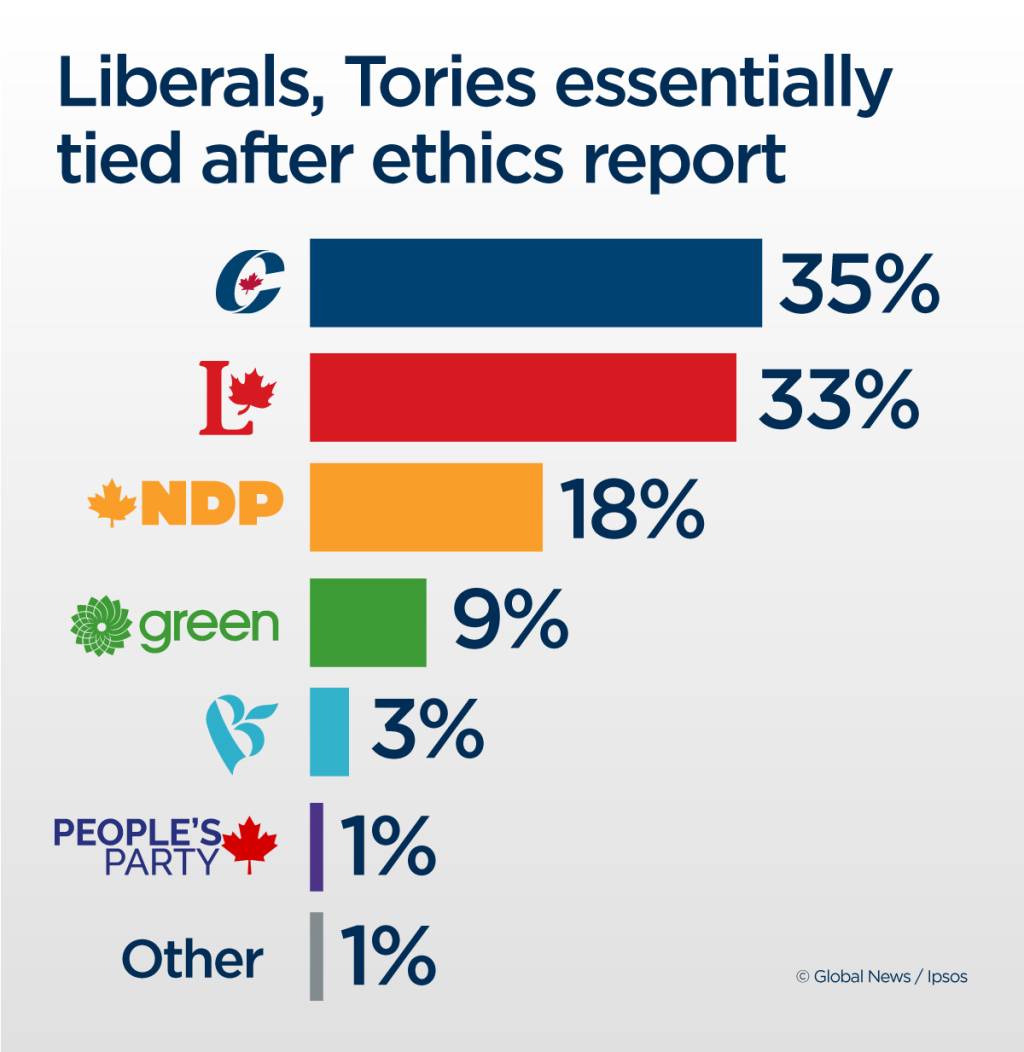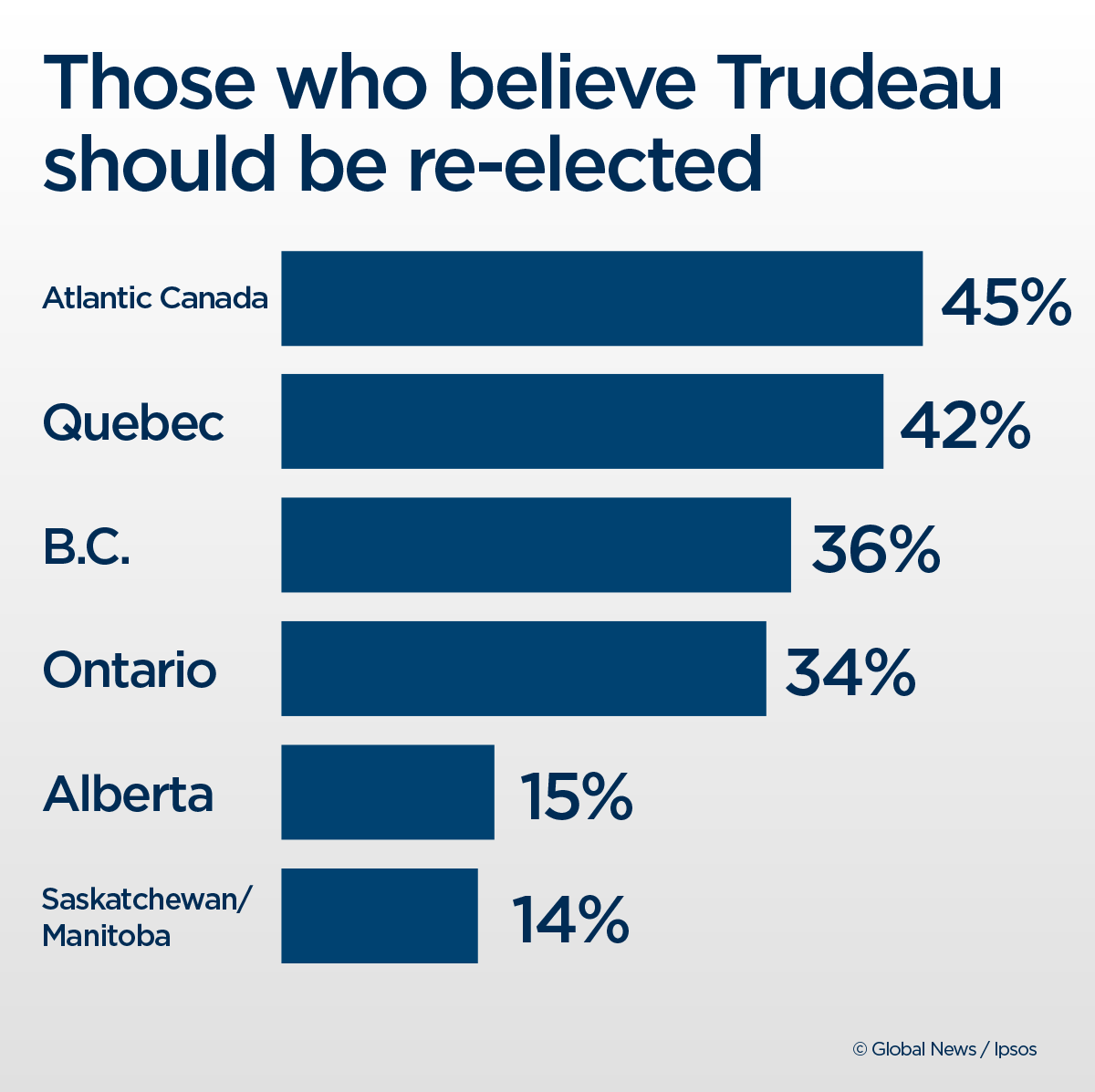New polls released suggest that support for the Liberals hasn’t changed much since a report found that Prime Minister Justin Trudeau broke federal ethics rules in the SNC-Lavalin affair.

An Ipsos poll conducted exclusively for Global News suggests the Liberals and Conservatives are in a virtual dead heat, with the Grits up two points since last month to 33 per cent of the decided vote and the Tories at 35 per cent, a two-point drop.
Mike Colledge, president of Ipsos Public Affairs, told Global News that that’s likely because Canadians had made up their minds on the controversy months ago.
“I think the eight weeks of coverage we had in the spring of the SNC-Lavalin affair really solidified things for people and I think we saw last week was a confirmation of the public’s view,” Colledge explained.
He noted that the report by Ethics Commissioner Mario Dion, which found that Trudeau tried to exert improper political influence in the SNC-Lavalin case, essentially “hardened” opinions.
Two other polls, one by Abacus Data and the other by Léger/The Canadian Press also found similar results.
The Léger poll showed the Liberals and Conservatives locked in a dead heat, with the support of 33 per cent of voters. Liberal support was also unchanged from the previous month, meaning the ethics report had virtually no effect. Conservative support was down three percentage points from last month.
Interestingly, the Abacus Data poll also noted that 35 per cent of Canadians had not even heard of the ethic’s report, while 48 per cent had heard “something about it.”
David Coletto, the CEO of Abacus Data, noted that opinions on SNC-Lavalin didn’t change much because of polarization among voters.
“It seems that views on the matter are polarized and to an extent baked into their wider views,” he said.

Get breaking National news
Coletto noted that according to the latest polling, the SNC-Lavalin controversy and the resulting ethics report have not “fundamentally changed the nature of the election.”
Melanee Thomas, a political science professor at the University of Calgary, noted that the lack of impact the ethics report had is not necessarily surprising for several reasons.
WATCH: Most Canadians want change in Ottawa, July Ipsos poll finds

Partisanship
She noted that partisan politics are at play, which means many Canadians who support the Liberals will continue to support them over another party.
“It’s kind of like having party-coloured glasses on, so you tend to emphasize information that makes your party look good and you tend to deemphasize information that makes your party look bad,” she said.
Thomas noted that cases such as the SNC-Lavalin scandal, or the 2011 controversy that found former prime minister Stephen Harper in contempt of Parliament, are often “super inside baseball” and Canadians don’t keep up with them.
“In the absence of understanding super inside baseball when one of these things come up, there is this idea of, ‘OK well then I’m going to follow opinions of leaders that I trust,'” she explained.
This is especially the case when there are third-parties involved, such as an ethics commissioner, who Canadians are not familiar with.
WATCH: Political experts weigh in on what to expect with 2 months until federal election

Polarization
Thomas also noted that there is a degree of polarization at play, which means certain groups across race, religion and socioeconomic factors are more likely to support certain parties — regardless of what they do.
She explained that this is often the case in the United States, where those who support the Democrats and Republicans are polarized and very unlikely to switch support.
Politics in such a situation becomes more about anger and “wanting to beat the other side” than about actual issues at hand, she said.
This has been the case with U.S. President Donald Trump’s support base, largely working-class and non-college educated white citizens, which has been relatively steady in the past years, despite recent reports that may be changing.
Thomas noted that she thinks Trump’s often “unprecedented” statements and actions don’t lead to real consequences due to the high degree of polarization in U.S. politics.
She said the process of polarization is not as advanced in Canada, which means north of the border, there can also be some other factors at play.
WATCH (Jan. 23, 2019): Trump’s disapproval rating is at an all-time high

Issues Canadians care about
Colledge noted that opposition parties will likely continue pushing the SNC-Lavalin controversy, even if they realize it won’t help them make gains, in order to distract the Liberals.
“They’d much rather get the Liberals talking about what they did and why they did it, then moving forward with their agenda,” he said.
“They’re defending SNC as opposed to talking about the things they’ve done in the past and want to do in the future on climate change, the economy, on a whole range of things.”
Meanwhile, he explained top issues on voters’ minds don’t include the SNC-Lavalin scandal.
“The top issues that people are saying I have an issue with (is) affordability — I don’t know that I’m going to be able to buy a home if you’re younger and getting started, I don’t know if I’m going to be able to send my kids to school, I’m concerned about what happens longer term in terms of my household income.”
However, with the federal election campaign still weeks away, it’s difficult to predict what could happen next.
Colledge noted the possibility of an RCMP investigation into the scandal is a “wildcard” that could change things up.
—
Exclusive Global News Ipsos polls are protected by copyright. The information and/or data may only be rebroadcast or republished with full and proper credit and attribution to “Global News Ipsos.” This poll was conducted between Aug. 16 and 19, 2019, using an online poll weighted to reflect census demographics. The precision of Ipsos online polls is measured using a credibility interval. This poll is accurate to within +/ – 3.5 percentage points, 19 times out of 20, had all Canadian adults been polled.
The online Leger survey of 1,535 voters was conducted Aug. 16-19 for The Canadian Press and weighted to reflect the makeup of Canada’s population. It cannot be assigned a margin of error because internet-based polls are not considered random samples.
— With files from Global News reporter Amanda Connolly, The Canadian Press















Comments
Want to discuss? Please read our Commenting Policy first.